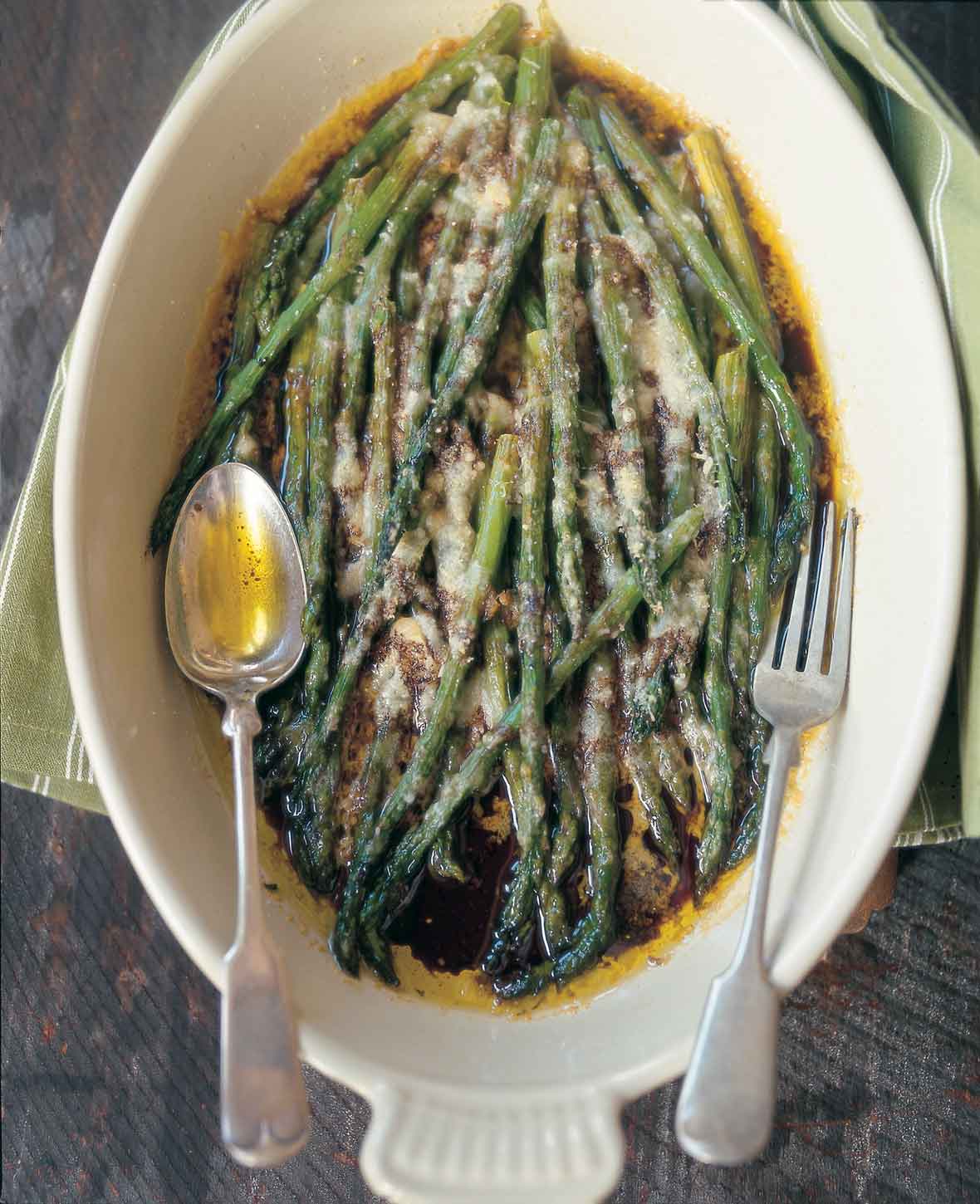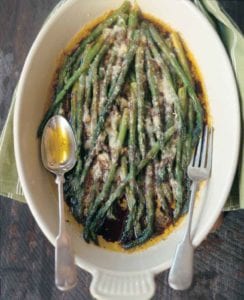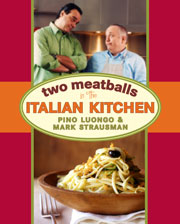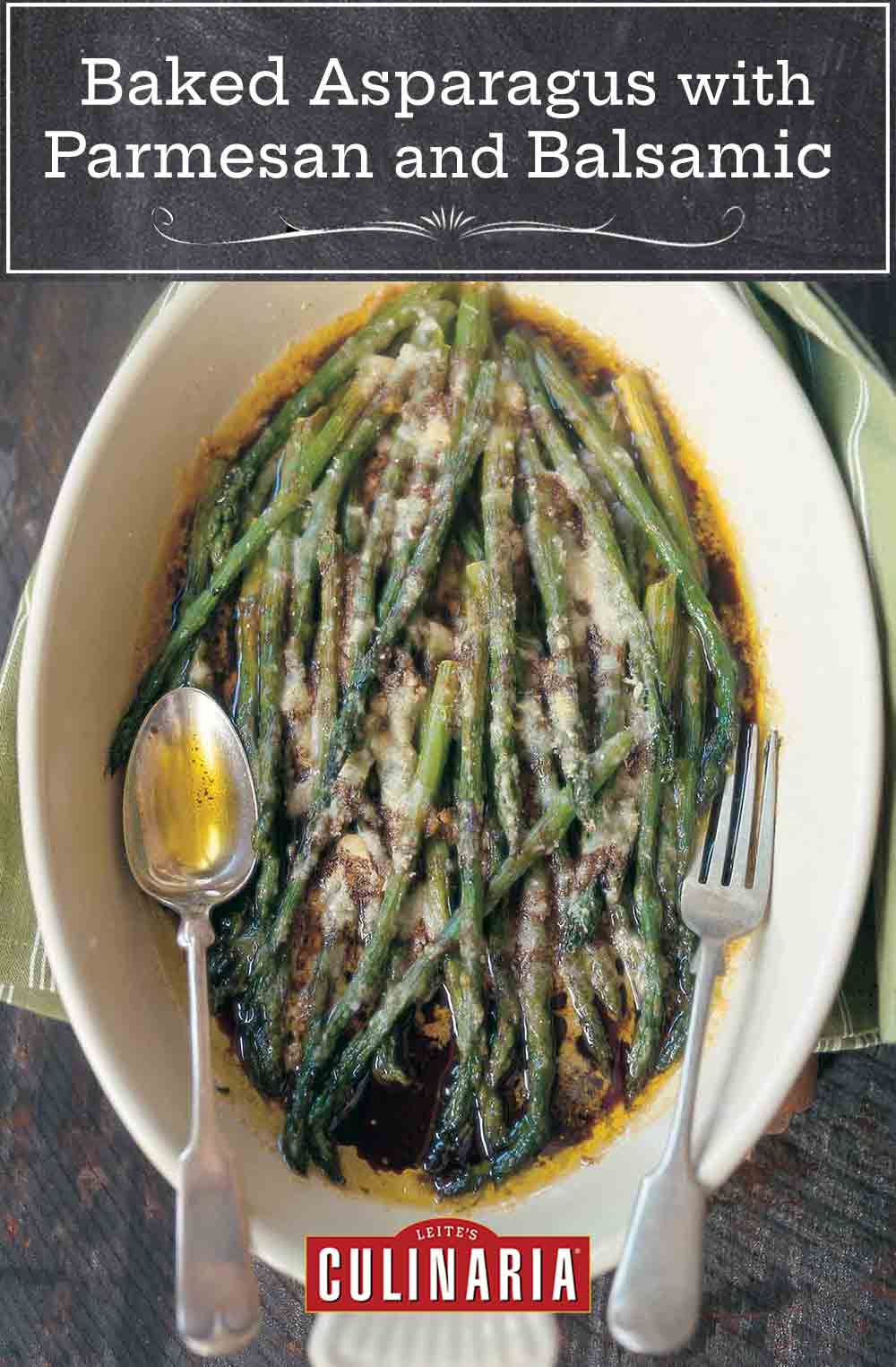
Jump To
The easiest way to get people to eat their vegetables is to cover them in cheese. Here I sprinkle some Parmigiano-Reggiano on top of blanched asparagus and bake it for a few minutes to melt the cheese. A little bit of balsamic vinegar finishes off the dish.
The best Italian balsamic vinegar is from Modena, where it is aged in barrels like wine for years. It’s fantastic on asparagus, but very expensive. We use it in the restaurant (we keep it in the office and use an eyedropper), but if you’re not ready to make the investment, you can vastly improve the taste of supermarket balsamic vinegar by cooking it down to a syrupy consistency, as I describe below.
However, if you can, do try the real thing at least once. It is worth it.–Mark Strausman
Why Do I Have to Cook the Asparagus Twice?
This indulgent approach to eating your veggies cleverly calls for first blanching, and then roasting, the asparagus. Rather than being redundant, the cooking tactic levels the playing field for spears of all thicknesses, ensuring they come out of the oven perfectly cooked at the precise moment its mantle of cheese turns handsomely burnished. This spear-savvy trick is a godsend for entertaining, allowing you to nonchalantly slide the dish in the oven minutes before the meal, as if it were no effort at all. You’re welcome.
What Wine Can I Serve with This?
Serve this dish as a spring appetizer with Sonoma-Cutrer Russian River Chardonnay, its perfect match.

Baked Asparagus with Parmesan and Balsamic Vinegar
Ingredients
- 1/2 cup decent-quality balsamic vinegar, or just a few drops of truly top-notch balsamic vinegar
- 1 tablespoon kosher salt, plus more to taste
- 2 bunches asparagus, (about 2 lbs), tough ends snapped off
- 1/4 cup extra-virgin olive oil, divided
- 1 cup freshly grated Parmigiano-Reggiano cheese
Instructions
- Preheat the oven to 350°F (175˚C).
- If using a pricy, top-notch balsamic vinegar, skip this step. Otherwise, pour the 1/2 cup decent-quality balsamic vinegar in a small saucepan and bring to a boil over medium-high heat. Reduce heat to medium-low and simmer, swirling the pan occasionally, until the vinegar is reduced to about 1/3 cup (about 4 to 8 minutes). The vinegar should be slightly thickened but still easily pourable, coating the back of a spoon lightly. Remove from heat immediately.
☞ TESTER TIP: The reduction will continue to thicken slightly as it cools.
- Bring a pot of water to boil. Add 1 tablespoon kosher salt and the 2 bunches asparagus and blanch until barely tender, about 1 minute for spears of average thickness, more for thicker spears and less for skinnier ones. Drain and rinse under cold water to stop the cooking. Pat the asparagus dry with paper towels.
- Place the asparagus in a single layer on a rimmed baking sheet or, if necessary, two sheets. Sprinkle the spears with salt to taste, drizzle with 2 tablespoons virgin olive oil, and turn to coat. Shower the asparagus with the 1 cup freshly grated Parmigiano-Reggiano cheese
- Bake until the spears are tender and the cheese is browned and almost bubbling (it won’t actually melt), about 5 minutes.
- Use a spatula to shimmy the asparagus from the baking sheet to a platter. Drizzle with 2 tablespoons of the reduced balsamic vinegar (or a few drops of the really top-notch stuff) and the remaining 2 tablespoons olive oil.
- Serve immediately, with the remaining reduced balsamic vinegar on the side.
Notes
In Advance Advice
You can blanch the asparagus and assemble the dish hours ahead of time, keeping it at room temperature until you slide it in the oven.
Nutrition
Nutrition information is automatically calculated, so should only be used as an approximation.
Recipe Testers’ Reviews
Wow! We’ll eat our vegetables like this every night. This combination of still slightly crisp asparagus, nutty cheese, and the sweet balsamic vinegar was a combination made in heaven.
The recipe was such that you could blanch the asparagus ahead of time, then just top it with cheese and olive oil and pop it in the oven at the last minute. I used 1/2 teaspoon of salt on the asparagus in addition to the 1 tablespoon in the simmering water.
This is the PERFECT side for grilled meat, roast chicken, or the braised short ribs that I served. We also loved the extra balsamic vinegar on the side—we kept dipping our asparagus in it. A delightful and delicious dish to add to my vegetable file!
If you don’t like asparagus, you need to try this recipe. It’s fantastic. I’ve always wanted to like asparagus, and I keep trying different recipes—but this one has converted me. This is very simple and quick to prepare.
Our asparagus were very thin so I didn’t blanch them. My only reason for not calling it absolutely perfect is that the Parmesan did not stick to the asparagus when it melted, it just sort of clumped up. Next time I’ll use a microplane grater on the cheese instead of finely grating it.
All of the flavors blended so well in this. I really loved the tart concentration of the balsamic reduction and the saltiness of the Parmesan cheese with the bright grassiness of the asparagus. I have made something similar before by roasting the asparagus. Simple, quick, easy, no fuss—yet elegant.
This would do equally well on a holiday buffet, as part of a meal for company, or as a weeknight side. I served this with Parmesan-crusted chicken breasts and warm bread.
If you love asparagus, this is heavenly. If you don’t, this recipe will convert you.
I used super-thin asparagus, so I didn’t blanch them. Also, because there’s cheese, go easy on the salt. The syrupy reduction of balsamic vinegar and melted cheese make this dish so delicious—just perfect for the spring season.
I rate this asparagus recipe a Testers’ Choice simply because it gives the reader a new, easy, elegant, and delicious recipe to make for family or company. The golden brown Parmesan with the slightly reduced balsamic vinegar adds a very special touch to otherwise boring asparagus. You won’t declare this the best thing you’ve ever eaten, but you and your guests will love the new taste sensation.
To make it even more special, add finely minced fresh rosemary to the balsamic vinegar as it reduces.
I’m always looking for new ways to cook my favorite veggies—and adding balsamic vinegar and Parmigiano to asparagus is a winning idea. The liberal sprinkling of freshly grated cheese with the caramel-y balsamic makes the asparagus rich and delicious.
The only drawback to this recipe is that it requires 3 pans: one for blanching the asparagus, one for reducing the balsamic, and one for baking the asparagus. Also, I cut back a bit on the salt and the olive oil in the final drizzle.
I usually make a version of this recipe that doesn’t require blanching, so I was excited to try this variation.
I used very thin asparagus, and normally when I roast asparagus that thin, it tends to overcook. The blanching method shortened the roasting time, so the spears stayed crisp and tender. As the season progresses and asparagus gets thicker, however, I’ll ditch the blanching method and continue to only roast them. All in all, I loved the recipe.
Roasted asparagus with cheese alone is a wonderful side dish, but the addition of the sweet, thickened balsamic syrup on top of the salty, cheese-baked asparagus provides a wonderful contrast in flavor. Hooray for a simple side that’s also sophisticated! This would work for a casual Sunday supper or even a fancier Saturday evening dinner party.
My grocery store only had the super-skinny asparagus, so I skipped the blanching step.
Overall, I loved this recipe and will definitely file it away for another menu.
This recipe makes an aesthetically beautiful side dish that paired well with pasta. I enjoyed the extra reduced balsamic vinegar as a drizzle on the side. Since my asparagus was rather thin, I didn’t bother blanching them, and for health reasons, I omitted the salt.
Overall, this is a delicious side dish that’s great for everyday meals, as well as entertaining. My hubby and I loved it and I’ll be making it again.
This recipe really is more than the sum of its parts. Simply blanched asparagus, Parmigiano-Reggiano and reduced balsamic vinegar—a classic combination.
I reduced the balsamic in a Pyrex in the microwave, which works just as well as the stovetop method. Just make sure to give it enough room to boil, and watch it carefully. It’s truly a versatile dish, with a terrific interplay of saltiness from the cheese and sweetness from the vinegar.
I’ve always loved asparagus, so it practically goes without saying that I love this recipe. My husband, on the other hand, puts asparagus in the same category as beets and Brussels sprouts. He needs them to be dressed up a bit to be palatable. So perhaps this is more to share with you that he gobbled up this dish and went back for seconds.
I started out by reducing the balsamic vinegar as directed. Although I didn’t see much of a change while the vinegar was on the stove, after sitting off the heat for a while it thickened to a molasses-like consistency. This made for a tangy yet sweet syrup that was good enough to lick straight from the spoon and was even better drizzled over cheesy asparagus. This isn’t exactly a low-cal vegetable dish. There’s quite a bit of cheese and oil. The result is delicious as written, but the final drizzle of oil could be omitted to lighten it up a bit.















We love roasted asparagus. While at first I thought why blanch, this makes sense so I will definitely try this method.
Yup, the blanching sort of ensures the asparagus is cooked through in the oven at the precise second the cheese is burnished. It’s an extra few minutes on the front end, but alleviates guesswork at the last second…let us know what you think after you try it!
Warm balsamic vinegar is heavenly. I’m excited to try out this recipe.
Let us know how it turned out for you, Damaris.
Melissa, I appreciated your comment. I was wondering if the final drizzle of oil could be left out.